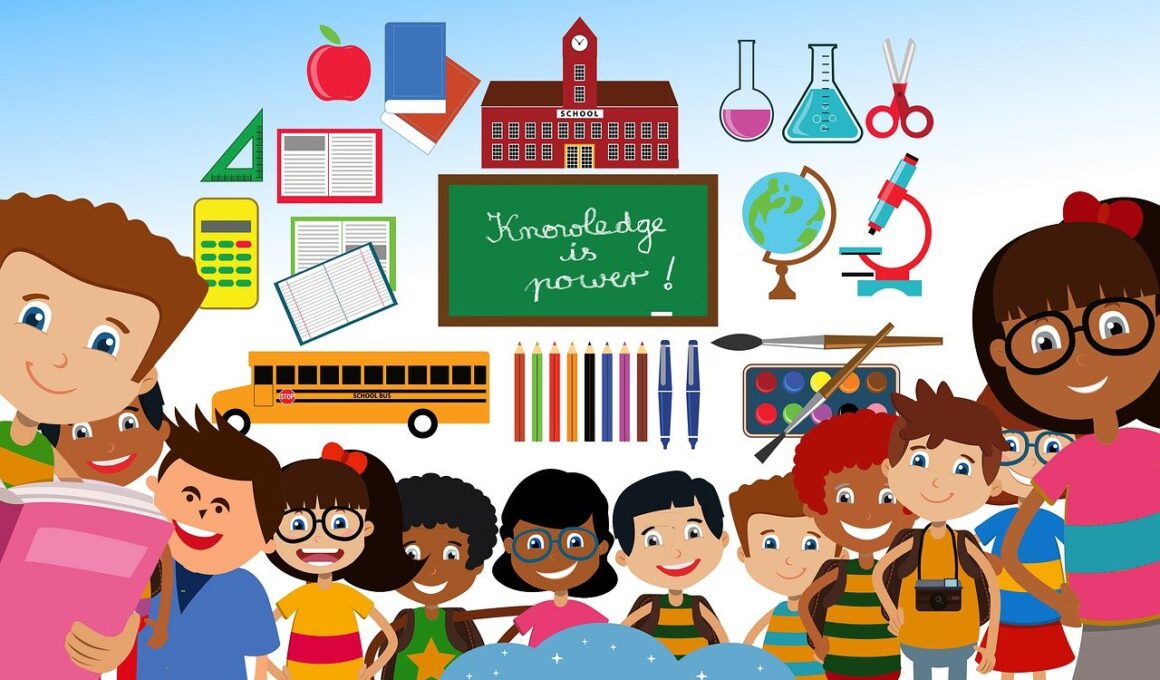Encouraging Social Skills Through After-School Sports
Participating in after-school sports activities offers kids a unique platform to develop essential social skills that are critical for their overall growth. Engaging in sports allows children to interact with their peers in a structured environment, fostering teamwork and collaboration. As they learn to work towards common goals, kids begin to understand the importance of communication and empathy. Additionally, these activities provide opportunities for children to resolve conflicts and handle competition gracefully, which are invaluable life skills. Sports often emphasize the need for respect, fairness, and accountability among teammates and opponents, helping children internalize these values. Coaches play a vital role in modeling appropriate behaviors while teaching young athletes about the significance of supporting one another. This guidance not only enhances individual character but also contributes to a sense of community within the team. As friendships bloom through shared victories and defeats, the social benefits of after-school sports extend beyond the field, promoting a more inclusive and understanding atmosphere. Ultimately, the lessons learned during these engaging experiences significantly shape children’s social narratives, ultimately aiding their integration into diverse social settings.
One of the most significant impacts of after-school sports on social skills is the enhancement of communication abilities among peers. Children must learn to express their thoughts and feelings succinctly, whether it’s calling out for passes, encouraging teammates, or even giving constructive feedback. These verbal skills transfer beyond the games, allowing children to communicate more effectively in school and other social environments. Moreover, participating in team sports introduces various social dynamics, compelling kids to navigate relationships and express themselves in diverse ways. Active involvement in discussions and planning during practice sessions strengthens a child’s ability to articulate ideas and build verbal reasoning skills. This type of communication practice encourages children to become better listeners, thus enriching their conversations. Coaches and team leaders also serve as pivotal figures in developing these communication skills, fostering an open dialogue and encouraging everyone to share opinions. Furthermore, learning to communicate effectively in competitive atmospheres helps establish an understanding of non-verbal cues, like body language, significantly improving interaction quality. As these interactions accumulate, kids naturally grow more comfortable engaging with peers, further solidifying their social networks throughout life.
Building Teamwork and Cooperation
Participation in after-school sports inherently revolves around teamwork, an essential social skill that children need to master early on. As they engage in sports, kids learn how to work together towards a common goal, a lesson that translates into other aspects of their lives, including academic collaboration. This cooperative spirit teaches children the importance of each individual’s role within a team, fostering a sense of belonging and mutual respect. Moreover, playing together reinforces the idea of collective achievement, emphasizing that success is often a group effort rather than an individual accomplishment. Through practice sessions and games, children experience the joy of celebration when wins occur, while also learning to support each other through losses. This balance of outcomes develops resilience, teaching kids how to handle both triumph and disappointment maturely and gracefully. Team sports also foster an environment of trust—kids learn they can rely on each other and that selflessness is vital. As friendships strengthen, kids begin to form deep connections, promoting inclusivity. By understanding various personalities within the team, children learn effective social adaptation, ultimately enhancing their ability to build lasting relationships.
Furthermore, after-school sports play a crucial role in teaching children negotiation skills, an important aspect of social interaction. When making decisions involving strategies, children must engage in discussions about their preferred methods of play. This requires them to listen to others, consider alternatives, and come to a consensus, essential components of successful negotiation. As they navigate disagreements, children implicitly learn the art of compromise and the necessity of finding solutions that satisfy all parties involved. These experiences enable kids to practice assertiveness while still respecting the views of others. Additionally, moments of conflict during games allow children to develop conflict-resolution strategies, helping them manage disputes constructively. As they learn to express their concerns and feelings, children become more adept at advocating for themselves while also being aware of others’ feelings. This balanced approach nurtures effective interpersonal skills, which are integral as they grow into adulthood. Ultimately, these negotiated interactions during sports not only help children refine their social abilities but also contribute to their emotional intelligence, which is essential for navigating diverse social situations later in life.
Emotional Management in Competitive Settings
After-school sports provide an excellent framework for kids to learn emotional management, a critical skill that complements the development of social abilities. Competition inevitably comes with a range of emotions, including excitement, anxiety, and disappointment. Through structured physical activities, children are introduced to real-life challenges where they learn how to channel their feelings positively. Experiencing both wins and losses allows kids to develop emotional resilience, teaching them how to cope, rebound, and maintain perspective. As they face high-pressure situations, kids hone their self-regulation skills, understanding the importance of staying calm and focused. Coaches often play a crucial role in guiding children through intense experiences, emphasizing the importance of sportsmanship and managing reactions. They instill the idea that it’s okay to feel upset after a loss but important to maintain respect for the game and opponents. Through these lessons, kids cultivate empathy, recognizing that everyone in the team shares similar feelings. Furthermore, learning how to manage disappointment and frustration fosters perseverance, reinforcing the concept that challenges are opportunities for growth. Over time, these skills lead to improved emotional wellbeing and better coping strategies outside sporting contexts.
In addition to fostering emotional resilience, after-school sports create a rewarding environment where children practice inclusivity and kindness. Team dynamics encourage kids to embrace diverse backgrounds and abilities, promoting an appreciation for differences. By interacting with team members from various cultures or skill levels, children develop empathy and understanding, essential social principles in today’s multicultural society. This exposure broadens their worldview and helps them cultivate friendships beyond just shared interests in sports. The messages of support and cooperation emphasize the value of uplifting others while making everyone feel accepted and valued. Coaches also contribute actively by incorporating activities designed to enhance social bonding and collaboration within teams, enhancing overall team spirit. Participation in varied roles, such as captain or mentor, empowers children to practice leadership and encourages them to be supportive of others’ needs. Furthermore, these experiences build a sense of community where all team members aim for collective success. Gradually, children learn that celebrating others’ achievements enhances their social development and fosters a happier environment required for personal progress. Overall, this culture of inclusivity transcends the context of sports, positively affecting children’s social networks in broader settings.
Conclusion: Lasting Impact of After-School Sports
Ultimately, the lessons learned through after-school sports extend far beyond the playing field; they shape children’s social development and emotional growth profoundly. Through active engagement in these activities, kids acquire invaluable skills such as effective communication, teamwork, negotiation, and emotional management. Furthermore, the nurturing relationships formed during these experiences help cultivate a sense of belonging, which is crucial for developing confidence and self-esteem. Coaches and peers alike not only serve as role models but also create supportive environments that promote learning while minimizing pressures associated with competition. The result is not merely improved athleticism but equipped children with techniques needed for forming constructive relationships in various settings. By participating in after-school sports, kids not only enjoy physical benefits; they also embrace emotional and social development opportunities essential for their future. The values instilled during these activities hold the potential to enhance their relationships and overall well-being. In summary, providing children with access to after-school sports programs is a valuable investment in their future, establishing a foundation for lifelong social skills that will serve them well throughout their lives.
To maximize the benefits of after-school sports, families and schools should actively promote participation in various programs tailored to children’s interests, ensuring inclusivity across all demographics. By providing diverse options, children can find activities that resonate with their passions, ultimately boosting motivation and enjoyment. In conclusion, after-school sports play an essential role in helping kids navigate the complexities of social interactions, allowing them to forge meaningful connections with their peers that last well into adulthood. Every interaction on the field is an opportunity for children to practice and hone their social abilities, better preparing them for the challenges of the real world. Encouraging participation in these activities is a crucial step toward establishing a well-rounded, confident, and socially competent individual. By reinforcing positive social behaviors and promoting healthy personal development, after-school sports naturally create a positive ripple effect that touches every facet of children’s lives. Thus, empowering children to embrace after-school sports can enhance their social skills, enabling them to thrive in varied social contexts as they grow.


